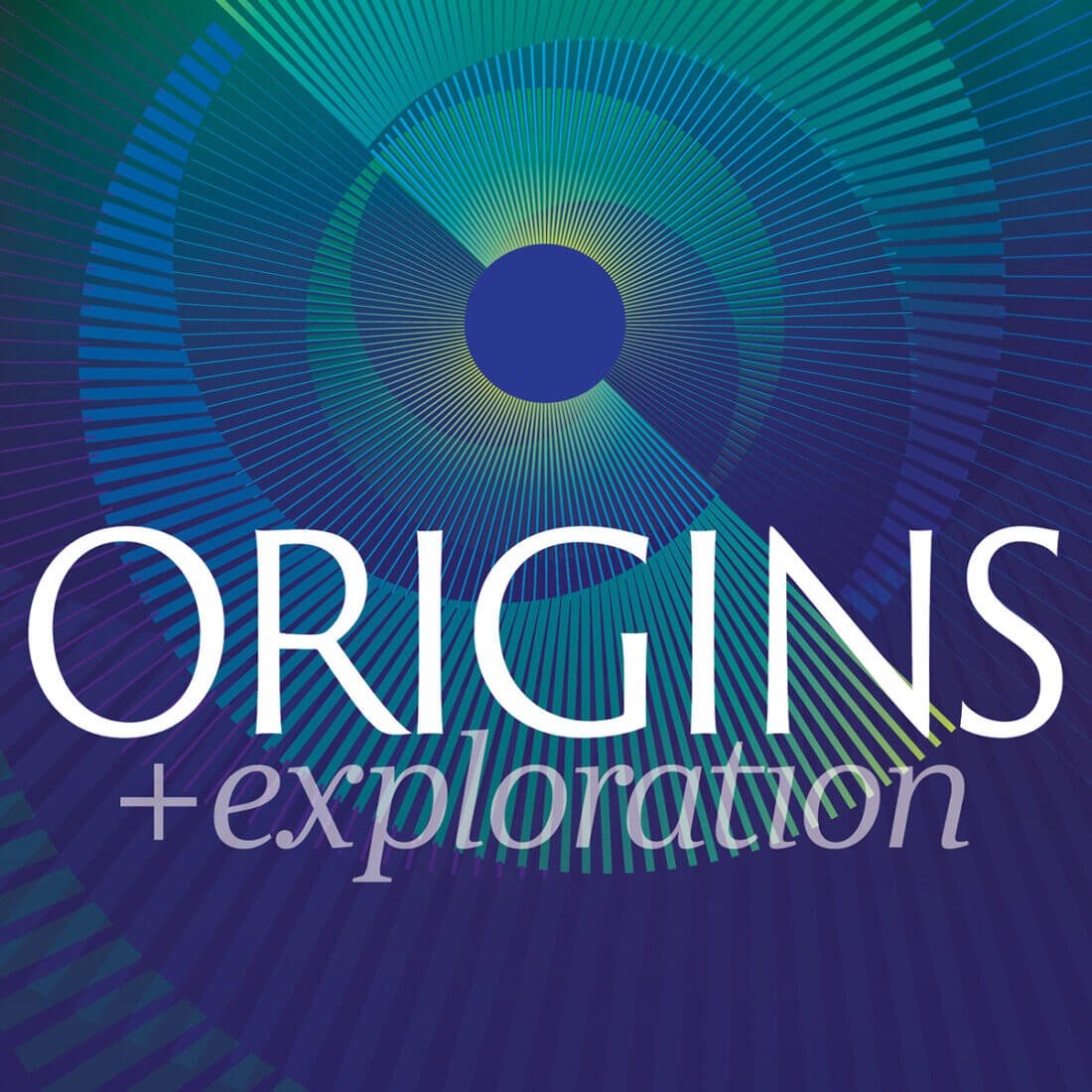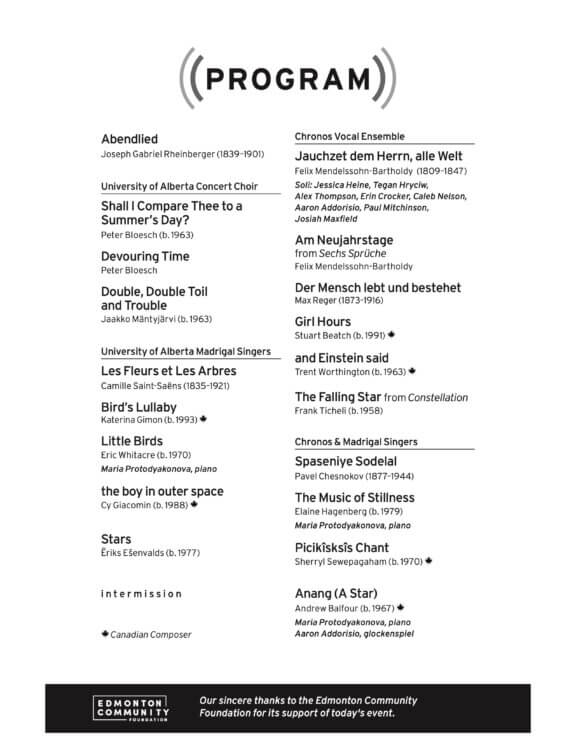Chronos presents: Origins + Exploration
In partnership with UofA Madrigal Singers and Concert Choir
This special collaborative performance with the University of Alberta Madrigal Singers (Timothy Shantz, conductor) and Concert Choir (Adam Robertson, conductor) connects us with the past and future. Jordan Van Biert and many Chronos singers are alumni of these influential ensembles. Formed in the early 1970s, these U of A Department of Music ensembles have had a profound effect on the artistic life of Edmonton, as a part of the history that has built a vibrant choral community in this northern city. Through this collaborative performance, Chronos engages with the next generation of skilled and passionate choral singers.
Extended Program Notes
University of Alberta Concert Choir
Peter Bloesch (pronounced “blesh”) is an award-winning composer who studied composition, orchestration, conducting, and film scoring, in prestigious “Scoring for Motion Pictures and Television” program at the University of Southern California. He learned the art of choral writing from a young age by being surrounded by a wealth of choral literature and exceptional choral performances — his father, Richard Bloesch, is a superb choral conductor and a respected authority on choral literature.
From Peter Bloesch peterbloesch.com
About this piece, Peter says: “For this famous sonnet by Shakespeare, I sought to create a very melodic and expressive setting. There certainly is passion in the text, but there is also a pervading tenderness throughout, and my music seeks to fuse these two elements together in musical terms.”
From Peter Bloesch peterbloesch.com
In Sonnet 19, Shakespeare laments the effects of Time on all creation, and my music reflects this sense of sadness and resignation.
Leading into the third verse (“But I forbid thee one most hateful crime: O, carve not with thy hours my love’s fair brow”), the music shifts to the major key briefly, expressing hope that perhaps Time will not destroy our physical beauty.
Although Time wins in the end, Shakespeare is nonetheless hopeful that his beloved youth will be granted immortality through the sonnet itself, so the music ends on a hopeful note with the words “Despite thy wrong, My love shall in my verse ever live young!”
From Peter Bloesch peterbloesch.com
Jaakko Mäntyjärvi (b. 1963 in Turku, Finland) has a diverse educational background, having studied English and Linguistics at the University of Helsinki, and music theory and choral conducting at the Sibelius Academy.
As a composer, Jaakko Mäntyjärvi describes himself as an eclectic traditionalist: he adopts influences from a number of styles and periods, and his musical language is based on an awareness of tradition, continuity and communicativeness. Because he is a choral singer, most of his published works (of which there are over 150) are for choir. “Double, Double Toil and Trouble” is from his set of Four Shakespeare Songs (1984), which he includes among is major choral works.
from Jaakko Mäntyjärvi http://www.jaakkomantyjarvi.fi/CVEN.html
The text is from Macbeth, Act IV, Scene 1
Macbeth is deep in blood from killing his potential rivals and is losing his sanity, suspecting everyone around him of treachery. Desperate to know what his future holds, Macbeth seeks out witches (those who “trade and traffic . . . in riddles and affairs of death”).
The witches prepare for Macbeth’s expected visit with this song, which describes their ritual of incantation around the brewing cauldron.
from Jaakko Mäntyjärvi http://www.jaakkomantyjarvi.fi/CVEN.html
Born in Priekule, Latvia in 1977, Ešenvalds studied at the Latvian Baptist Theological Seminary before obtaining his Master’s degree in composition from the Latvian Academy of Music. He is one of the most sought-after composers working today, and has won multiple awards for his work, which has been premiered by professional ensembles across the globe.
Originally commissioned and composed for mixed choir by the Salt Lake Vocal Artists in 2011, Stars evokes the wonder, mystery, and overpowering beauty of the limitless expanse of stars above us. This piece requires singing glasses, which a few choristers will be playing, each tuned to a specific note by varying quantities of water. The glasses never stop singing, and, surrounded by these vibrations, you almost feel like the stars themselves are humming to you.
Chronos Vocal Ensemble
“It is almost too poetic that Max Reger (1873–1916) should have been found dead in Leipzig’s Hotel Hentschel, aged just 43, with the galley proofs of Der Mensch lebt und bestehet open at his bedside. Reger was deeply involved with early music (Bach’s above all) during his short life; influence of Bach’s chorales is plain on the surface of the music, and Trinitarian key symbolism of A major at the poetic volta emphasizes the switch in focus from temporal/human to eternal/divine in a tradition dating back to Bach’s time. The penultimate sonority is all Reger’s own, and is just as moving at
100 years’ age as when it was born.”
Iain Gillis
Girl Hours is based on the life of Henrietta Swan Leavitt, an influential American astronomer who discovered a way to measure the distances of stars in the early twentieth century. Alongside other women, Leavitt was employed at the Harvard College Conservatory as a human computer, made to study photographs and make calculations, rather than operating the telescopes. As a result, the director of the conservatory measured the difficulty of their projects in ‘girl hours’. Samatar’s elegant poetry turns this belittling phrase into a statement of power and a testament to the important intellectual labour of these women. My music imagines Leavitt working late into the night, studying her photographic plates and seeing instead the immensity of the universe stretching before her.
from Stuart Beatch – score
Originally written for Dr Richard Sparks and Pro Coro Canada for a concert entitled “Space”. This piece has caught the attention of several choirs and has been performed and recorded. The six movements are each rather short, the whole piece is about 10 minutes. Each of the six movements is based on a quotable quote of Albert Einstein. These short pieces, based on quotes by Albert Einstein, demonstrate the wittiness of the scientist and the brilliance of the composer.
from Trent Worthington http://trentworthington.ca/composition/and-einstein-said/

